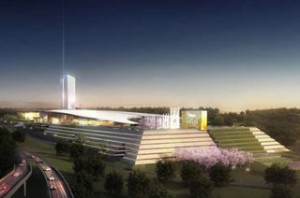
An artist’s rendering of the MGM National Harbor project.
The Prince George’s County’s Council approved plans July 21 to complete a $925 million MGM Resorts International, National Harbor project that includes a casino, hotel, and several restaurants. County Executive Rushern Baker, said the deal will leave a “transformative impact” on residents, businesses, and communities.
In the agreement, which establishes an employment target of 40 and 50 percent among county residents and veterans, and best effort and aspirational goals of 20 to 30 percent County-Based Minority Businesses (CMBE) contracting, law makers and residents are optimistic the plan would bring economic stability to the county.
The casino will house 3,600 slot machines, 140 table games, and a 300-room hotel, and could open as early as July 2016.
Roland Jones, acting director of the Office of Central Services, the primary county agency responsible for increasing job opportunities for residents, remains confident about the long-range goals of the MGM agreement. “We believe that MGM has set reasonable but aggressive targets for employment and contracting, which – combined with their job training and business development programs – will be a game-changer for our county,” Jones said.
In addition to local hiring and contracting goals, the agreement sets up sustained philanthropic commitments. Before the opening of the facility, MGM has agreed to donate $1 million to local organizations that provide workforce training and to non-profits that benefit the county.

MGM National Harbor
After the opening, MGM would reportedly donate $400,000 each year, a funding commitment which does not expire. The Community Benefits Agreement also contains provisions for educational opportunities, youth internships, a high school culinary program, and contractor scale-up and mentoring programs.
An 8-1 vote by the council signaled the potential for increased business for Keion Drake, a Seat Pleasant, Md. electrician, who said the project would stabilize an increasingly undertrained workforce. Though the unemployment rate has decreased steadily in the last four years, averaging 6.0 for the first six months of 2014, concerns remain over a steady influx of new residents.
“The destruction of low-income and affordable housing in D.C. has pushed a lot of unskilled and unemployed people across the District line into the county, compounding our economic issues. The benefit with this agreement is that Rushern Baker added training and community-building to the plan,” Drake, 31, said.
Trained through an apprenticeship program in 2003, Drake said that instead of fearing the competition, the training would strengthen the infrastructure of the county as a whole, by creating a viable and skilled pool of citizens. “We need the industry and this will help get a lot of people back to work, including our seniors. The benefits will outweigh the drawbacks, which ultimately spell success for the county,” Drake said.

An artist’s rendering of the MGM National Harbor project.
Others like Deborah Pulliam, of Temple Hills, Md., believe that while jobs are needed, the casino would invite a criminal element and promote gambling among those least capable of handling the risk of financial loss. “The county definitely needs employment-generating industries and economically, MGM may bring jobs into the area, but they have the potential to also foster vice. We do not want Prince Georges County to become another Atlantic City, where crime and violence overshadow the original illusion of financial prosperity,” Pulliam said.
Pulliam said that as a Christian mother of three, she was splintered in her desire to vote for an economic upturn for the county through the promotion of gambling when the casino issue was introduced on the 2012 Maryland ballot. Ultimately, her religious convictions won out and she voted against it. “The belief is that there is money to be made in the development of the casino and then ‘fun’ to be had by visitors to the casino. The reality is that people who have very little will gamble what they do have on a ‘pie in the sky’ hope of winning big rather than paying bills. I fear senior citizens and those already economically disenfranchised will be most harmed,” Pulliam said.
Whether the county can mimic the successes of Las Vegas – fostering economic development, job growth, and a low tax burden for residents with the MGM plan – remains to be seen; only time will tell. For now, the impending economic recovery is enough to keep many contractors and residents hopeful.

